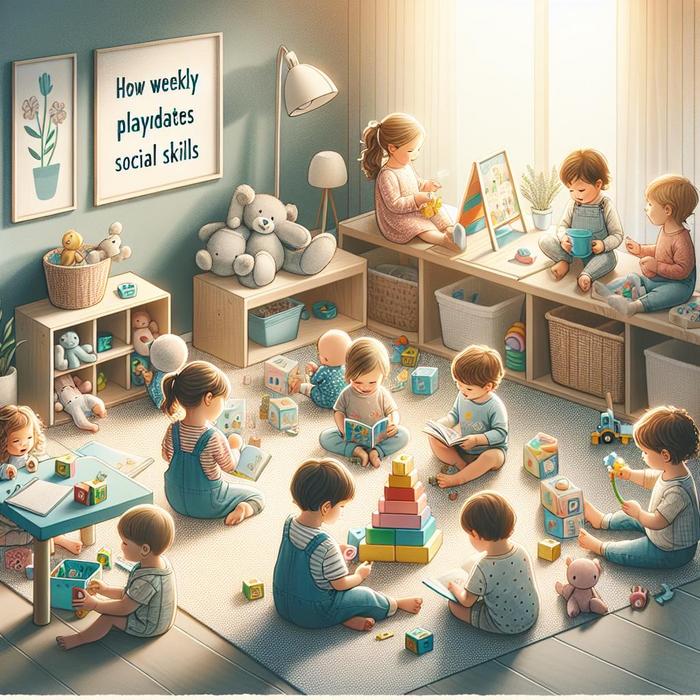Fostering Healthy Relationships through Organizing Playdates
Playdates are not merely a source of amusement for our babies; they play a fundamental role in their social skills development. As parents, we’ve experienced firsthand how these interactive activities have significant impacts on our child’s growth.
Interactive Activities: The Foundation of Social Skills Development
Interactive activities provided by playdates are the building blocks of social skills for our little ones. According to a study published by the American Academy of Pediatrics, play promotes cognitive, physical, social, and emotional well-being, offering children a chance to explore their environment, practice emerging skills, and build complex learning competences.
Our child’s experience aligns with this research. Whether it was sharing toys or playing cooperative games, these interactive activities offered opportunities for our baby to learn the nuances of social interaction. We saw improvements in emotional intelligence, conflict resolution, cooperative behavior, and patience.
Overcoming Challenges and Building Relationships through Playdates
Organizing playdates is no easy job. Coordinating schedules, ensuring compatibility, and supervising interactions can be daunting. However, the rewards far outweigh the difficulties. From our experience and the experiences of others, we found that regular playdate sessions significantly boost our baby’s ability to forge long-lasting relationships.
A Reddit thread on social skill development in preschoolers highlighted how parents noticed improved speech, empathy, and social confidence among children who regularly participate in playdates.
Integrating Breastfeeding and Self-feeding with Playdates
Incorporating normal routines, like breastfeeding and self-feeding, into playdates can be challenging but rewarding. It allows your baby to stay nourished while interacting with peers, building familiarity with social dining norms.
You can read about our experience with breastfeeding on the go and fostering self-feeding in our other blog posts: Breastfeeding on the Go: Tips for Mobile Mothers, and Fostering Independence: How We Encouraged Self-Feeding in Our Toddler.
The Importance of Regular Playdates
Building relationships and social skills cannot be achieved through sporadic playdates. Regularity is key. Every opportunity to interact adds to your child’s social skills development, building up confidence, and enhancing their ability to understand, communicate, and connect with others.
A Happy Baby, A Better Future
Our efforts in organizing playdates have resulted in a happier and socially adept baby. Not only has our child developed strong relationships with peers, but we, as parents, have also created networks of support. It’s encouraging to see our baby thrive, knowing that these initial steps contribute to his future success in a social world.
We have seen the incredible outcomes of these efforts and want to share this journey with you. As we head into the next chapter, it’s reassuring to know that we’re arming our baby with the necessary tools to flourish in interpersonal relationships and interactive scenarios.
Creating a Supportive Environment for Playdates
Creating a welcoming and safe environment for our little ones to play and interact is paramount. You can set the mood by putting out their favorite toys, arranging child-friendly furniture, or even setting up an outdoor activity if the weather permits.
Remember, the goal is to encourage meaningful interaction and development in a comfortable environment, reducing the chances of your child feeling overwhelmed or anxious.
Choosing the Right Friends for Playdates
Playdate friend selection moved beyond merely coordinating schedules with our acquaintances’ children; it became a significant determinant of our child’s behavior and development.
We considered factors like age, shared interests, and social traits to ensure compatibility. Interacting with like-minded children allowed our child to learn and grow, with fewer conflicts that could impede the interactive learning experience.
How Playdates Improved Parent Relationships
Organizing playdates doesn’t only benefit our little one. It also provides an opportunity for us, as parents, to communicate and learn from others who share similar experiences. We’ve found solace in the shared joys, challenges, and laughs that parenting presents.
These social interactions create a sense of community and mutual support among parents, significantly reducing the parenting stress and isolation feelings that many of us experience.
Playdate Activities That Foster Social Skills
Contrary to what some might believe, playdates aren’t restricted to traditional play. There are plenty of other activities that can be thrown into the mix that stimulate social skill development.
According to Mindnasium and NSPT, activities like arts and crafts, pretend play, sports, and reading together can enhance skills such as cooperation, empathy, sharing, and active listening to your little one.
Tips to Make Playdates More Effective
In our experience, setting specific goals for each playdate, like sharing or cooperative play, improves the effectiveness of these interactive sessions.
Talking to the child about these goals before and after the playdate helps to reinforce the lessons learned. Encouraging positive behaviors and addressing negative ones, with appropriate guidance and discipline, are also crucial for effective skill development.
Another helpful tip is to keep the playdates small, particularly at the start. This approach allows your child to focus on building a close connection with one or two peers before gradually expanding their social circle.
Turning Challenges into Opportunities
While managing playdates presents several challenges, each of them serves as an opportunity for growth – both for our child and us as parents. From time management to dealing with disagreements among children, each hurdle has pushed us to grow and adapt.
For instance, tantrums and disagreements, while tough to handle, offer an excellent opportunity to teach our child about conflict resolution, emotional management, and empathy.
Acknowledging the Benefits of Interactive Play
There’s no denying the benefits derived from organizing regular playdates. As highlighted by Child Focus and Therapy and Wellness Connection, the development of social skills, emotional intelligence, speech, and more, are significant reasons why we commit to organizing these activities.
Despite the efforts and challenges, knowing that the bonds our baby are forming now are contributing to a brighter, socially adept future makes every minute worth it.

